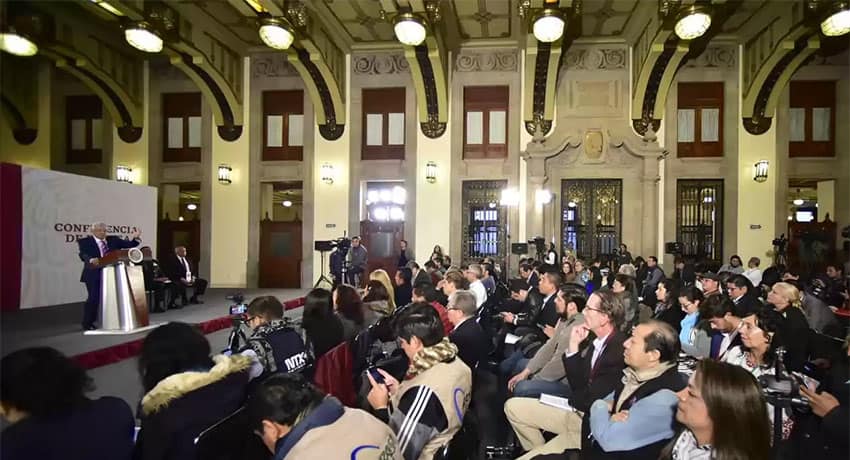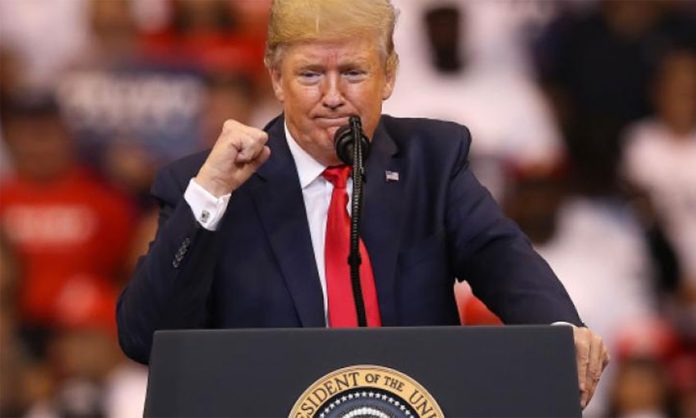The United States will designate Mexican drug cartels as terrorist organizations, U.S. President Donald Trump said in an interview Tuesday, triggering a request by Mexico for high-level bilateral talks.
“They will be designated . . . I have been working on that for the last 90 days” Trump told political commentator Bill O’Reilly.
“We’re losing 100,000 people a year to . . .what’s coming through Mexico,” Trump said, referring to narcotics trafficking. “They [the cartels] have unlimited money . . . it’s drug money and human trafficking money . . .”
Trump’s remarks prompted a swift response from the Secretariat of Foreign Affairs (SRE).
“The foreign secretary [Marcelo Ebrard] will establish contact with his counterpart, Michael R. Pompeo, in order to discuss this very important issue for the bilateral agenda,” the SRE said in a statement.
“In accordance with the good relations . . . between both countries, the Mexican government will seek a high-level meeting as soon as possible to present Mexico’s position and understand the point of view of United States authorities.”
Ebrard said Tuesday that he believed designating cartels as terrorists was unnecessary and stressed that Mexico will not allow a United States intervention in Mexico, an assertion repeated by President López Obrador on Wednesday.
He said he did not wish to start an argument on the eve of the Thanksgiving holiday in the U.S. so his message to Donald Trump was a brief one: “Cooperation yes, interventionism no. And that’s where we shall leave it.”
López Obrador also offered hugs to U.S. citizens in celebration of the holiday.
Trump’s affirmation that the terrorist designation will be made came two days after the LeBarón family, who lost nine members in a suspected cartel ambush this month, posted a petition to a White House website that calls on the United States government to do exactly that.
But conservative U.S. lawmakers have been urging the Trump administration to classify cartels as terrorists since early this year.

Two Republican party representatives called for the move in a February letter to Secretary of State Pompeo, and soon after Trump endorsed the idea, telling the news website Breitbart, “we’re thinking about doing it very seriously . . . Mexico, unfortunately, has lost control of the cartels.”
Once a group is designated as a terrorist organization, it is illegal under U.S. law for people to knowingly offer support. Members of the organization are barred from entering the United States and those already in the country face deportation.
Financial institutions that become aware they have funds linked to a terrorist group must block the money and notify the U.S. Treasury Department.
Some of the implications of the designation were aired by Mexican columnist León Krauze in The Washington Post last week. He wrote that a terrorist designation of Mexican cartels “would greatly complicate an already strained bilateral agenda.”
He said “the U.S. government would be immediately granted a set of blunt diplomatic instruments that could have unforeseen consequences for both countries.” He noted that U.S. intelligence capabilities and the government’s ability to antagonize people suspected of assisting cartels would both increase.
“. . . While the situation in Mexico is undeniably difficult, the designation of some of the country’s cartels as terrorist organizations seems disproportionate and counterproductive,” Krauze wrote.
Arturo Sarukhán, a former Mexican ambassador to the United States, told Milenio TV that a designation could have “very broad and brutal political, diplomatic, financial, economic and commercial consequences.”
The move would reinforce “this narrative of Mexico as a threat to the national security of the United States,” he said.
The editor of the newspaper El Economista argued that the planned designation is politically motivated, writing in an opinion piece that “the president knows that attacking Mexico can offer him a high return from his electoral base.”
Luis Miguel González contended that the move would further complicate U.S. ratification of the new North American trade agreement and could cause the bilateral relationship to plummet to “new lows.”
He predicted that the U.S. president will increasingly use Mexico as a punching bag as the 2020 presidential election draws closer.
“. . . Will Trump take the Mexican piñata out of the garage? You can bet that he will. Perhaps he won’t dare to break it because of the high risk that implies . . .” González wrote.
“[But] maybe he will because he likes strong emotions, because he’s a supporter of protectionism more than free trade and . . . because he doesn’t like Mexico. It’s as simple as that.”
Source: Milenio (sp), Reuters (en), El Economista (sp), The Washington Post (en)
